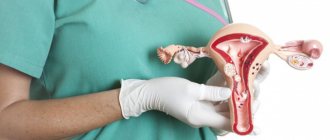Calculating the gestational age is not always such a simple task. Of course, if you know exactly when the only attempt to conceive a child was, then you will not have any special problems with determining the duration of pregnancy, but even in such a situation, not everything is clear. After all, pregnancy does not begin immediately after the end of sexual intercourse.
Knowing exactly the day the pregnancy began is important because most procedures, tests and standards are strictly tied to certain cycles of the perinatal period.
Determining the duration of pregnancy by the date of the last menstruation
The easiest way to determine the duration of pregnancy is to start from the date of the last menstruation. After successful conception, the next menstruation begins in the 4th week of pregnancy. This technique implies that the fertilized egg begins to divide even before ovulation. The method is used when calculating the obstetric gestational age and calculating the expected date of birth (ED) using a special formula. This technique allows you to more or less accurately calculate the timing of a regular menstrual cycle. The gestational age calculated from the date of the last menstruation has an error of two weeks.
The timing of birth depends on various reasons: is there a norm?
The content of the article
Gynecologists say that there is no standard period for normal childbirth - there are conditional frameworks. Normal birth can occur at 37 or 44 weeks. It is generally typical for twins to be born at 36-37 weeks, and women with a long monthly cycle have every chance of giving birth after 42 weeks.
You need to understand that if a child was born normally developed at any stage, this is the norm. In case of deviations in development and health due to the timing of birth, children are divided into premature and post-term.
- Babies with low weight, height, and poor development of organs and body are called premature. Their mothers carried them for less than 37 weeks - until the 260th day of pregnancy, so the babies were not able to achieve the required parameters. According to statistics, 20% of children are born premature.
- Post-term babies are born after 42-44 weeks - during the period 294-308 days of pregnancy. Don’t think that if you carry your baby to term you will give birth to a giant. On the contrary, there are signs of a post-term baby: thinness, dry, wrinkled skin, weak muscles. The reason for this condition is the aging and death of the placenta, through which nutrients were supplied. Approximately 10% of mothers undergo nursing.
From all of the above it follows that it is better to give birth at 37-42 weeks. Knowing exactly when this moment should come, it is easy to navigate during premature contractions or when you are postmaturity.
Gestational age and hCG
The duration of pregnancy can be determined by the level of human chorionic gonadotropin (hCG) in the blood of the pregnant woman. To do this, you need to donate blood from a vein. As a rule, this method is used in very early stages, when the woman still does not know for sure whether she is pregnant. All popular pregnancy tests are based on the principle of determining the amount of hCG.
So, in the end, we can conclude that the most accurate method for determining the gestational age is ultrasound, but in order to determine the gestational age as correctly as possible, it is necessary to use a set of measures.
Knowing the day of conception and early ultrasound data allows you to reliably calculate the gestational age. Often, the entire combination of these methods is used to determine the gestational age.
You can find many interactive pregnancy calculators on the Internet where you can calculate your due date week by week and track your baby's development.
Changes in the female body and fetal development by trimester
The female body undergoes serious restructuring during gestation. Each trimester brings new physiological changes and increases the risk of developing certain pathologies.
First trimester
The first trimester of gestation is the most difficult period of pregnancy. When a new life is born, all organs and systems begin to function completely differently. So what changes occur in a woman’s body?
- The ovary forms the corpus luteum, which produces large quantities of progesterone. This hormone creates the most favorable conditions for implantation of a fertilized egg into the endometrium of the uterine cavity.
- The chorion of the embryo begins to produce the hormone hCG, which maintains the functionality of the corpus luteum.
- The pituitary gland increases the production of prolactin. Thanks to this, the fat cells of the mammary glands are replaced with secretory ones - this is how the body prepares for breastfeeding. In addition, the hormone regulates the functioning of a woman’s adrenal glands and affects the development of the embryo’s respiratory system.
- Immunity decreases, which increases the risk of developing inflammatory processes and exacerbation of chronic diseases that were observed in a woman before pregnancy.
- The excitability of the central nervous system increases. In this regard, a woman experiences drowsiness, irritability, and fatigue.
- Starting from the 5th week of gestation, most pregnant women experience toxicosis, which is accompanied by nausea and changes in eating behavior.
In addition, pregnant women may experience a decrease in visual acuity, a burning sensation and dryness in the eyes. If you have such symptoms, you should definitely consult an ophthalmologist.
The first trimester of gestation is an important stage in the development of the embryo, when all the organs and systems of the unborn baby are formed. The formation of the brain and spinal cord, digestive system, respiratory organs, heart, blood vessels, and endocrine glands occurs. The skeleton, muscle tissue, and genitals are formed. By the end of the first trimester, it becomes possible to determine the gender of the unborn child. The pregnant woman’s condition is improving: toxicosis and irritability disappear.
more about changes in the female body and embryo development in the 1st trimester in our article.
Second trimester
As a rule, the second trimester of gestation is much more stable than the first. Such unpleasant symptoms as nausea and increased fatigue are already behind us. The pregnant woman begins to feel more comfortable. However, the unborn baby continues to develop and grow, which cannot but affect the woman’s physical condition.
It is in the second trimester that women often experience a lack of calcium, which is spent on the needs of the child. A deficiency of this substance can affect the condition of the teeth. It is important to address any dental problems during pregnancy immediately. All body systems are interconnected, and even caries can cause serious inflammatory processes. Read about the features of dental treatment during gestation .
In mid-pregnancy, women have an increased risk of inflammatory diseases of the genitourinary system. This is due to an increase in the size of the fetus and uterus, specific changes in the condition of the mucous membrane of the genital tract and, of course, a decrease in the body’s defenses. Pathologies that were previously unusual for women may occur: pyelonephritis, cystitis, bacterial vaginosis.
In addition, in the second trimester, the load on bones, muscles and ligaments increases. To avoid the development of pathologies of the musculoskeletal system, it is important for a woman to visit an osteopath. How a specialist can help during pregnancy - detailed information in our material .
Physiological changes in the female body in the second trimester include:
- white vaginal discharge, which occurs due to increased secretion of estrogen;
- false contractions caused by “training” contractions of the uterus. They are more characteristic of the 3rd trimester; their presence in the second trimester may indicate a threat of miscarriage;
- enlargement of the abdomen and mammary glands;
- increased sensitivity of the nipples.
How does the fetus develop during the second trimester? He is growing quickly and gaining weight. The musculoskeletal system, immune, respiratory, reproductive, and urinary systems are improved.
complete information about fetal development in the second trimester in our article .
Third trimester
The last trimester of gestation is accompanied by rapid weight gain of the pregnant woman, which is primarily due to the intensive growth of the fetus. During this period, it is very important to carefully monitor body weight and prevent the development of obesity. Being overweight can cause gestational diabetes, a serious disease that often causes fetal abnormalities and difficult births.
In the third trimester, as in the second, the risk of developing inflammatory processes in the genitourinary area is increased. If kidney pathologies occur during pregnancy, then the woman experiences pain in the lower abdomen, symptoms of intoxication of the body (nausea, vomiting, diarrhea), and painful urination.
Inflammatory processes in the genital area may be accompanied by pathological vaginal discharge, itching in the genital area, and pain in the lower abdomen. The appearance of any of the listed symptoms should be a reason to contact a specialist.
At the end of pregnancy, there is a high probability of developing gestosis, which is characterized by a triad of symptoms:
- high blood pressure;
- swelling;
- the appearance of protein in the urine.
An obstetrician-gynecologist treats the disease and monitors the effectiveness of therapy . For the first degree of gestosis, outpatient treatment is allowed. In case of complicated forms of the disease, the pregnant woman is sent to the hospital.
What happens to the unborn baby during the third trimester? Weight and height increase very quickly. The fetus begins to see and hear better, can respond to light and sounds, focus its gaze, smile and move actively.
For more information about how intrauterine fetal development occurs week by week, read our material .
We increase the accuracy of the examination result
How to do it? Much depends on the expectant mother and how informed she is on this issue. Some may come for an ultrasound too early or delay the procedure.
There are dates for performing an ultrasound to determine pregnancy: 12, 18, 30-34 weeks.
By coming for an ultrasound scan at the appointed time, you can not only facilitate the doctor’s task of determining the period of fetal development, but also identify malformations in time, if any are present. To be completely confident in the accuracy of the specialist’s conclusions, additional ultrasound examinations can be performed. Based on the results of the two tests, precise conclusions are drawn.
Also, direct preparation for the study plays an important role in obtaining the correct result. It includes:
- exclusion (48 hours before the examination) from the diet of foods that increase gas formation, such as legumes, rye baked goods, dairy products, and some fruits;
- sometimes the doctor may recommend taking a certain dose of a carminative containing simethicone or activated carbon: it is important that the intestines are emptied and there is no flatulence;
- Previously, it was advised to take a certain amount of liquid half an hour before the test so that the bladder, when filling, would displace the uterus, but today there are devices with increased accuracy, so there is no need to drink a large amount of liquid before the examination.
Diagnostic error?
Usually, if medicine has not been able to help us in any way, we can become disappointed in it, and some people completely refuse further help from doctors. Under no circumstances should this happen to a pregnant woman.
Let's consider the reasons that sometimes cast doubt on how accurately ultrasound determines the gestational age:
- too early diagnosis: ultrasound cannot be performed earlier than the appointed time;
- outdated equipment; to avoid misunderstandings for this reason, choose in advance medical centers that enjoy a good reputation;
- The ultrasound may have been performed superficially or the doctor does not have enough experience in this area of medicine; it is worth consulting with another specialist at the same time, preferably not in a multidisciplinary center, but in a specialized center;
- Finally, the saddest reason for this so-called error may be a miscarriage.










